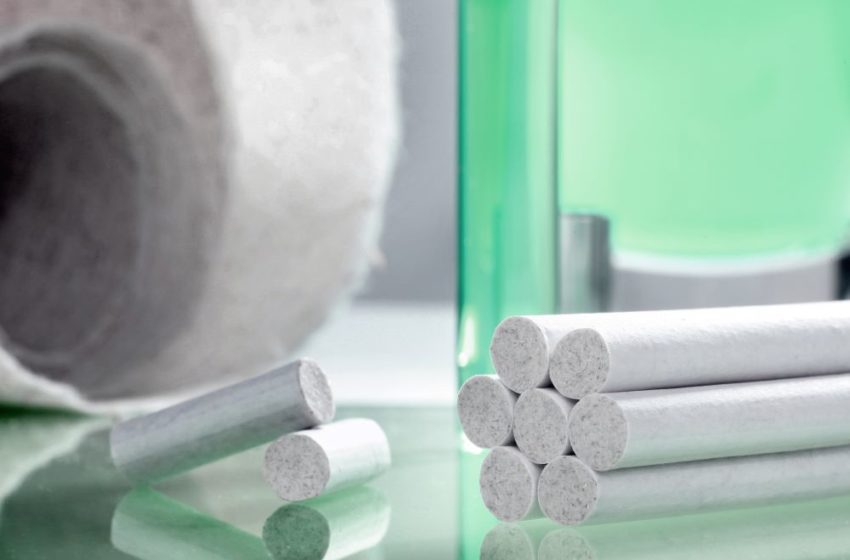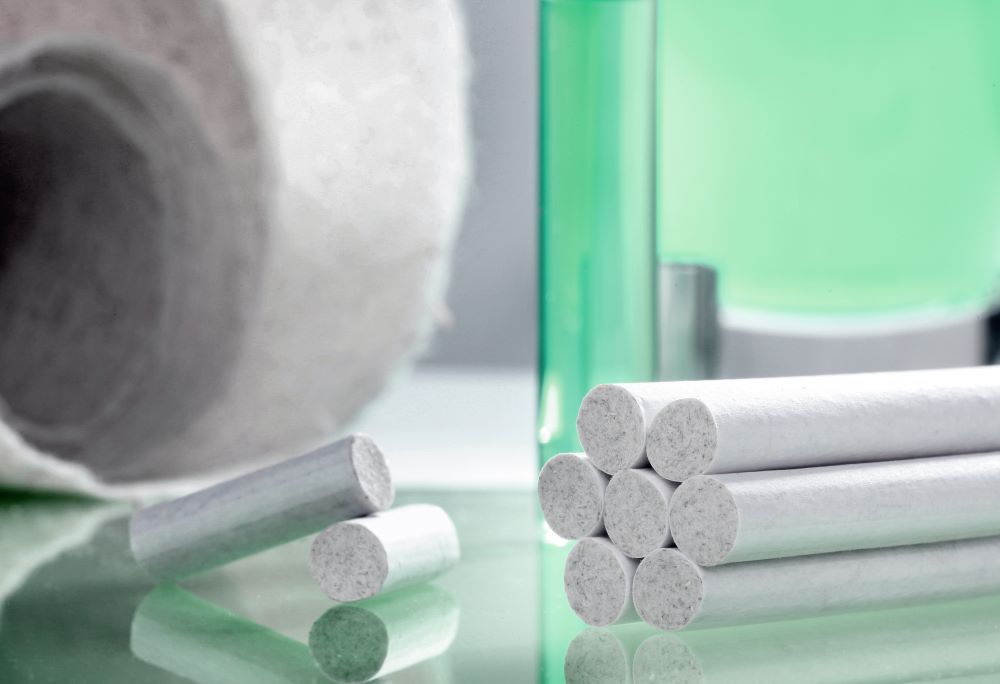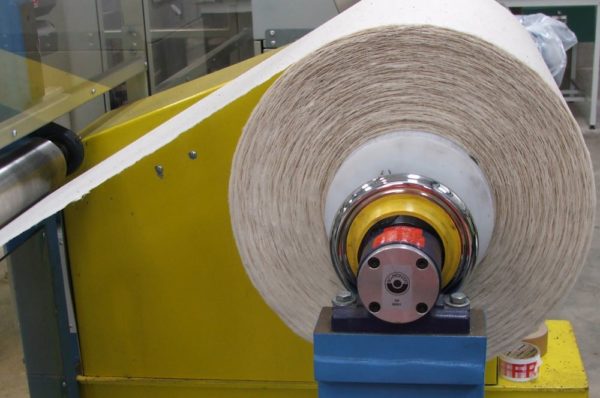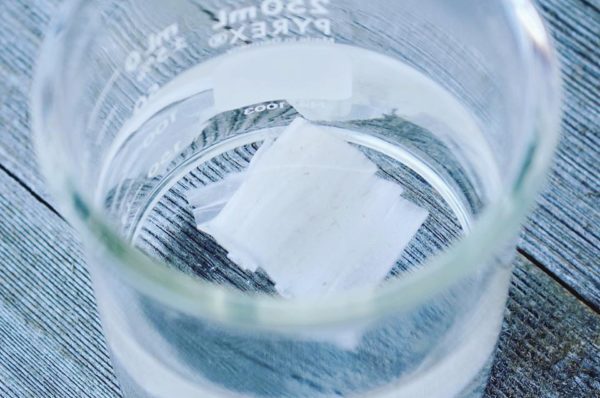A Future Without Plastics
- Also in TR Filters Print Edition
- March 1, 2023
- 0
- 10 minutes read

Photo courtesy of Greenbutts

With its new environmentally friendly technology, Greenbutts wants to tackle the challenge of filter litter.
By Stefanie Rossel
Of the more than 5 trillion cigarettes produced globally each year, the majority ends up in the environment after consumption. Cigarette butts are the most littered plastic item on earth as many smokers don’t consider them to be litter. According to the Truth Initiative, butts have consistently made up 30 percent to 40 percent of all items collected in annual international coastal and urban cleanups since the 1980s.
While most of a cigarette’s components quickly disintegrate when smoked or disposed of, the filter will stick around for some time. Around 98 percent of cigarette filters comprise cellulose acetate (CA), a polymer that is slow to degrade in the environment. It can take up to 14 years for a CA filter to degrade, depending on the conditions of the environment where it has been discarded.

“Our estimation is that more than 4 trillion plastic butts are littered every year, and marine life researchers warn that there could be more plastic than fish in the ocean by 2050,” says Tadas Lisauskas, founder and CEO of California-based Greenbutts. “Urgent action is needed.”
A material-science and impact-driven business, Greenbutts has made it its mission to eliminate CA cigarette litter. The company was founded in 2010 by Lisauskas and Xavier Van Osten, who were newcomers to the cigarette filter business at that time but were acutely aware of the need for a green alternative to the plastics-containing filters polluting the environment.
They soon learned that creating a viable substitute was a science in itself. In addition to degrading quickly when discarded in the environment, a biodegradable filter or filter substrate must meet many requirements, such as adequate smoke chemistry and acceptable sensory performance. The filter must also be suitable for processing on high-speed filter assembly equipment and cigarette making machinery.
To help tackle these challenges, Greenbutts hired a former executive of specialty filter manufacturer Filtrona as technical advisor and teamed up with experts from the U.K. Nonwovens Innovation and Research Institute to evaluate fibers with sufficient porosity and thickness.
Greenbutts spent almost a decade designing and developing filters that provide comparable taste and filtration properties as current CA filters but will disperse in water within several minutes with agitation and begin to degrade in compost within several days.
After years of R&D and testing with tobacco companies, the company came up with a patented substrate and filters made of all-natural, food-grade fibers, such as abaca fiber, cotton flock and industrial hemp as well as a starch-based binder, which were introduced to the market in the summer of 2019. The product is sold in bulk or as ready-made rods of filters and filter tips. The blend of materials allows for the same filter manufacturing rates as acetate filters, according to Greenbutts.

Better Alternative
Greenbutts is now ready to take its innovation to the next level. In November, the company introduced Greenbossing, a trademarked process developed with Boegli-Gravures. According to the companies, the innovation will revolutionize Greenbutts’ filter rod manufacturing. “We want to offer to the tobacco industry not just an alternative but the state-of-the-art solution,” explains Lisauskas. “We believe we are creating the next generation of biodegradable filters by introducing our patented Greenbossing technology. Boegli and Greenbutts are actively innovating together and leading a sustainability pathway and building the future today. The Greenbossing technology arrives at the perfect time to accelerate the transitioning from cellulose acetate, which is a single-use plastic (SUP), to Greenbutts’ fully biodegradable and water dispersible substrate. The innovation will enhance the existing filtration capabilities and sensorial experience and much more, setting the Greenbutts substrate far ahead of all competitors and establishing a new ‘gold standard’ for cigarette filters.”
CA filters are still considered the gold standard in cigarette filtration. While it is still early days, Lisauskas believes they may very well lose that position to his Greenbossing products. “The initial analytical lab tests have shown promising results, and we will be able to share them in due time,” he says.
Regulatory Pressure
In recent years, awareness of the cigarette litter problem has increased. Several countries are considering legislation to reduce cigarette butt waste. In July 2021, the European Union enacted its Single-Use Plastics Directive (SUPD). While the SUPD does not oblige tobacco manufacturers to use plastics-free cigarette filters, it requires producers to fund consumer awareness campaigns, extended producer responsibility schemes and tobacco filter collection initiatives from December 2023.

“The question is not if the CA plastic filters will be banned; the question is when they will be banned,” says Luis Sanches, chief strategy officer at Greenbutts. “The CA butts are the No. 1 most littered single-used plastic item in the world, and there is no logical reason to stop them from being banned. Many other SUPs have already been banned, such as plastic straws, cutlery, plastic bags, plastic cups. And the banning of the CA plastic filters is simply a matter of time. The tobacco business is aware of this, and there is clear indication that they are fully committed to drive the change. We at Greenbutts believe that through awareness and education, the industry will eventually drive the change, the regulators will enforce the change, consumers will deliver the change. We at Greenbutts are facilitating this change to occur.”
Despite the significant problem of cigarette litter, CA filters continue to dominate the market. Not only because CA has been a tried-and-tested, cost-effective material but also because there were no external incentives, such as stricter regulations, encouraging a rethink. In the U.S., the expensive regulatory approval process for new products actually presented a barrier to more environmentally friendly filters. In the first years since the launch, Greenbutts therefore marketed its product to hemp cigarette manufacturers and the marijuana industry.

Into the Future
The Greenbossing technology may help Greenbutts overcome the regulatory hurdle. “The FDA authorization is a lengthy and meticulous process,” says Lisauskas. “It requires a lot of data, patience and solid science. We have already started the process with the collaboration of world-class scientists and our legal team to embark on this challenging journey.”
As rules for environmental protection tighten around the world, cigarette filter manufacturers and other industry players have stepped up their efforts to provide alternatives to CA-based filters. Most of these solutions, however, are made from paper, a substrate that presents challenges. For example, paper behaves differently than cellulose acetate so that it requires adjustments in the design of the filter and cigarette, and it often comes with a characteristic taste and smell.
“The sensory performance, I would say, is the most challenging factor to overcome,” says Lisauskas. “The chemically and physically modified filaments of cellulose acetate associated with the plasticizer, triacetin, make the plastic filter a very well-designed filtration tool for several chemical compounds present in tobacco smoke.”
The Greenbutts filter with the Greenbossing technology, by contrast, utilizes natural fibers, specifically selected for their sensorial neutrality, filtration capability and mechanical strength. This combination minimizes natural variability, enables airflow control and reduces paper filters’ cellulosic sensorial notes, according to Lisauskas.
The company has recently experienced a clear and growing interest from EU-based tobacco companies in its product. “We can attest that other organizations, outside the EU, want to take the lead on the sustainability agenda by giving consumers what they are looking for: authentic products, no plastic, no chemicals, no additives, and all-natural alternatives,” says Lisauskas.
Sanches hopes that because of the further benefits delivered by the Greenbossing process, the tobacco industry will adopt Greenbossing eventually as its new standard for both combustible and heated-tobacco products. “And it will open up further opportunities for other combustible products beyond tobacco,” he says.
The company already has some experience with heated products. In August 2021, Greenbutts entered into an agreement with Poda Lifestyle and Wellness, which uses the biodegradable filters in its Beyond Burn Poda Pods.
Greenbutts is currently evaluating heated-tobacco products, Lisauskas relates. “There is nothing that should impede the successful application to this sector,” he says. “The Greenbossing process should deliver the perfect match.”


